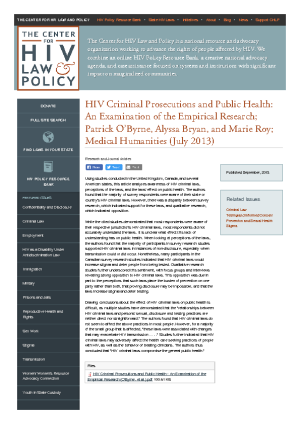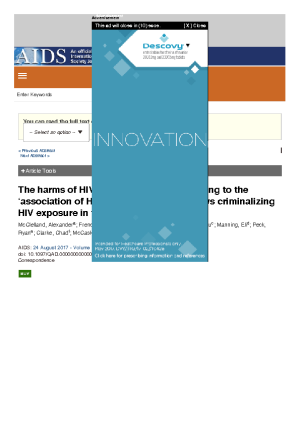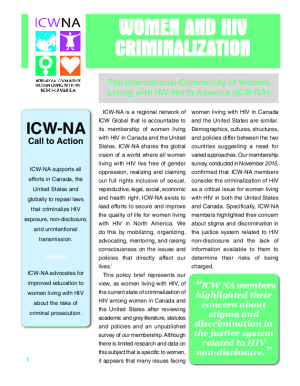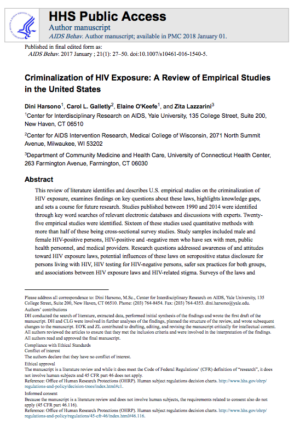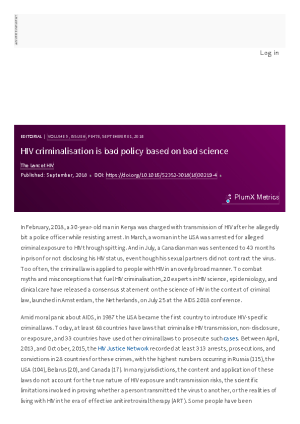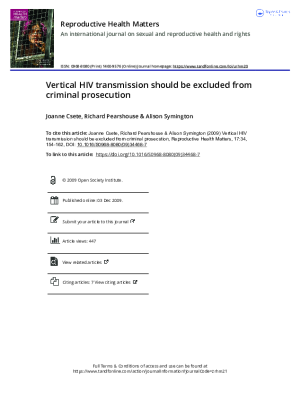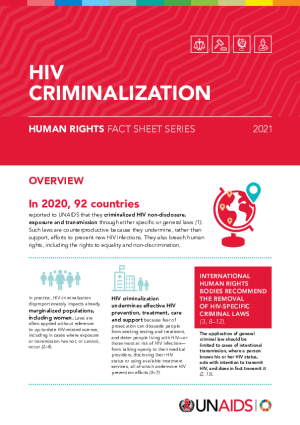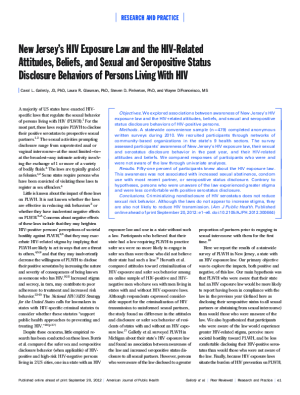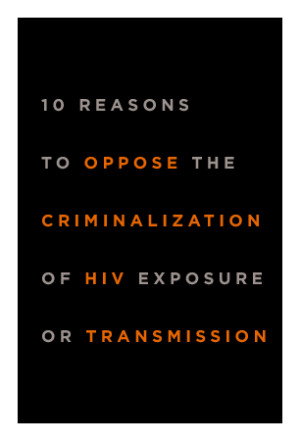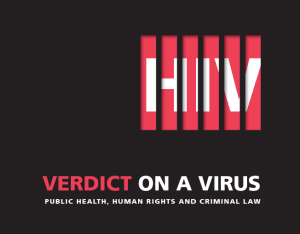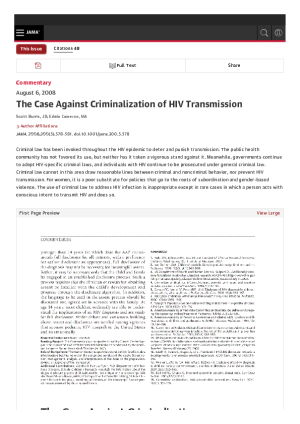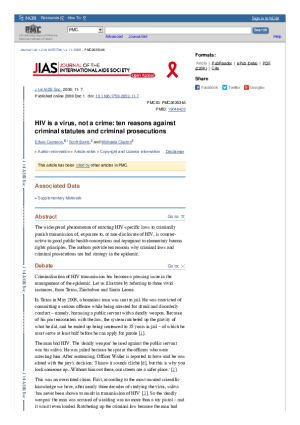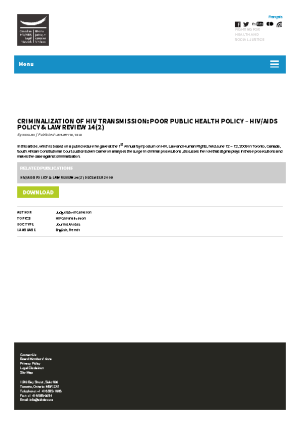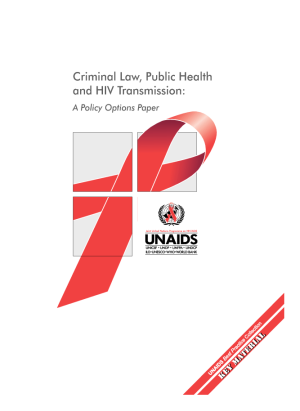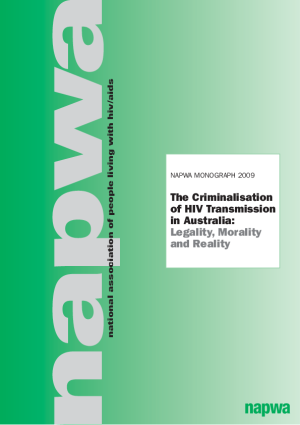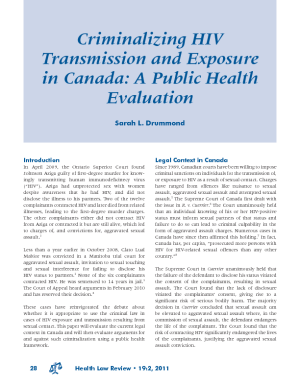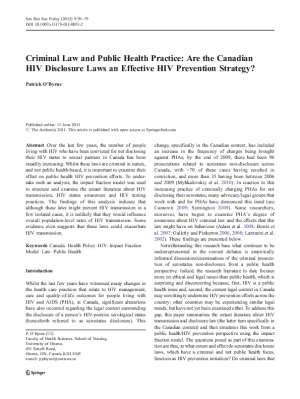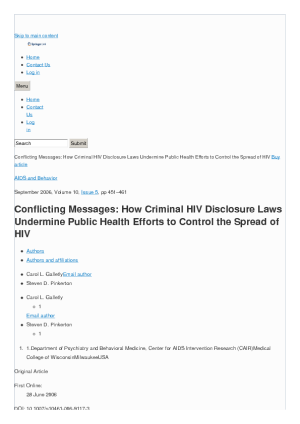Concludes that HIV-related criminal laws either fail to influence or increase STI testing avoidance, unprotected anonymous sexual contacts, and avoidance of health care because respondents do not feel safe speaking with health professionals. Suggests HIV-related criminal laws compromise public health and clinicians’ abilities to establish therapeutic relationships and to undertake HIV prevention and treatment work.
Does not help - Summary Articles
These resources consider the effects of HIV criminalisation, arguing that criminalisation undermines effective HIV strategy and negatively impacts people living with HIV.
The harms of HIV criminalization: responding to the ‘association of HIV diagnosis rates and laws criminalizing HIV exposure in the United States’
Critiques findings from CDC research suggesting criminal exposure laws have had no detectable HIV prevention effect, arguing that by taking account of social science research, even stronger conclusions about the harms of HIV exposure laws are possible.
Women and HIV criminalization
This policy brief represents the view, as women living with HIV, of the current state of criminalization of HIV among women in Canada and the United States after reviewing academic and grey literature, statutes and policies and an unpublished survey of membership. ICW-NA members highlighted their concern about stigma and discrimination in the justice system related to HIV non-disclosure.
Criminalization of HIV Exposure: A Review of Empirical Studies in the United States
This review of literature identifies and describes US empirical studies on the criminalization of HIV exposure, examines findings on key questions about these laws, highlights knowledge gaps, and sets a course for future research.
HIV criminalisation is bad policy based on bad science
Lancet editorial welcoming the expert consensus statement on the science of HIV in the context of criminal law..
Limit Cases: How and why we can and should decriminalise HIV Transmission, exposure and non-disclosure
ABSTRACT: Across the world, people living with HIV and AIDS (PLHA) face investigation, prosecution, conviction, and punishment if they transmit HIV to another person, expose others to the risk of HIV acquisition, or fail to disclose in advance their HIV positive status. This article seeks to explain why limiting the criminalisation of HIV is important and necessary; identifies some of the ways in which it has been, and might be, limited; and, finally, offers some reflections on whether there exists a principled limit to decriminalisation arguments (ie whether there are cases which, even if the general principles underpinning decriminalisation is accepted, justify state punishment). Drawing on recent international policy guidance, current scientific knowledge about HIV prevention and treatment, and research on the impact of criminalisation of PLHA, the article argues that decriminalisation is critical to eradicating HIV and should be a public health priority, that biomedical advances in prevention and treatment will assist the decriminalisation project but are insufficient in the absence of legal and criminal justice practice reform.
Expert affidavit in E.L. case on breastfeeding risk
Affidavit provided to the High Court from Dr Ruth M Bland, a medical expert with extensive expertise in conducting research in the field of HIV transmission, concluding that in her expert opinion in the case of E.L. the risk of HIV transmission to the child after a single exposure of breast milk whilst on ART is “infinitesimally small”.
Vertical HIV transmission should be excluded from criminal prosecution (2009)
Joanne Csete and colleagues argue that criminal laws on HIV transmission and exposure should be reviewed and revised to ensure that vertical transmission is explicitly excluded as an object of criminal prosecution. Scaling up PMTCT services and ensuring that they are affordable, accessible, welcoming and of good quality is the most effective strategy for reducing vertical transmission of HIV and should be the primary strategy in all countries.
HIV Criminalization – Human Rights Fact sheet Series
Series of fact sheets on human rights highlighting the critical need to scale up action on rights. Short, easy to digest and accessible document outlining the latest epidemiology, the evidence of the impact of human rights interventions, the latest targets, and international guidelines, recommendations and human rights obligations.
Other factsheets in the same series released in June 2021 include: HIV and people who use drugs, HIV and gay men and who have sex with other men, HIV and transgender and other gender-diverse people, HIV and sex work, HIV and people in prisons and other closed settings and HIV and stigma and discrimination.
Sexual Behavior, Stigma, Perceived Hostility, Comfort With Disclosure and New Jersey’s HIV Exposure Law
Findings from this study indicate that the law may have minimal impact on the disclosure behavior of people with HIV, and is not an effective structural HIV prevention intervention. The researchers posit that internalized normative values likely guide disclosure, irrespective of the law. As a result, the authors argue that interventions designed “to increase comfort with seropositive status disclosure may be a better way to achieve the desired behaviors.
Oslo Declaration on HIV Criminalisation
Outlines the importance of a cohesive, evidence-informed approach to use of criminal law relating to HIV non-disclosure, exposure and transmission. Urges Ministries of Health and Justice, public health officials, policymakers and criminal justice system actors to ensure a proportionate response to HIV transmission risk.
Ten Reasons to Oppose the Criminalization of HIV Exposure or Transmission
Provides ten reasons why criminalizing HIV exposure or transmission is unjust and ineffective public policy. Argues criminalization is unlikely to prevent new infections or reduce women’s vulnerability to HIV. Instead, criminalisation may harm women and has a negative impact on public health and human rights.
10 Reasons Why Criminalisation of HIV Exposure or Transmission Harms Women
Argues that applying criminal law to HIV exposure or transmission does nothing to address the epidemic of gender-based violence or the deep economic, social, and political inequalities that are at the root of women’s and girls’ disproportionate vulnerability to HIV.
- Alternative links
- French / Français
Verdict on a Virus
Provides case studies and opinions from around the world, as well as resources and information to support legal advocacy and social mobilisation.
- Alternative links
- French / Français, Russian / русский
Warning: file_get_contents(https://api.vimeo.com/videos/327215365): failed to open stream: HTTP request failed! HTTP/1.1 404 Not Found in /home/hivjustice/apps/hivjusticetoolkit_live/wp-content/themes/hjntoolkit/functions.php on line 625
More Harm than Good
Filmed at an international meeting on HIV prevention and criminal law in Toronto in April 2013, More Harm than Good features interviews with social scientists, researchers and legal and public health experts describing the public health impact of HIV criminalisation.
The Case Against Criminalization of HIV Transmission
Argues that although criminal law has been invoked throughout the HIV epidemic, the public health community has neither favoured its use nor taken a vigorous stand against it. States criminal law cannot draw reasonable lines between criminal and noncriminal behaviour, or prevent HIV transmission. For women, it is a poor substitute for policies that go to the roots of subordination and gender-based violence.
Criminal statutes and criminal prosecutions in the epidemic: help or hindrance?
Mexico International AIDS Conference 2008 – Closing Plenary Speech by Justice Edwin Cameron. Outlines cases and details many of the problems with criminalisation.
Criminalization of HIV transmission: poor public health policy
Analyses the surge in criminal prosecutions, discusses the role that stigma plays and makes the case against criminalisation.
Criminalizing consensual sexual behaviour in the context of HIV: Consequences, evidence, and leadership
Provides an overview of the use of the criminal law to regulate sexual behaviour in three areas, including HIV exposure during consensual sex. The paper highlights negative effects of HIV criminalisation and argues that strong institutional leadership from UN agencies is required.
Criminal Law, Public Health and HIV Transmission: A Policy Options Paper
Proposes principles to guide thinking about law and policy on criminal law and HIV, considers alternative to criminalization, and makes recommendations about appropriate use of criminal sanctions and coercive public health measures.
The Criminalisation of HIV Transmission in Australia: Legality, Morality and Reality
Addresses the criminal prosecution of people who transmit HIV in Australia. Examines the legal, moral and ethical justification for laws criminalising HIV transmission and the impacts of criminalisation on people with HIV.
Criminalizing HIV transmission and exposure in Canada: A public health evaluation
Considers HIV non-disclosure criminal cases in Canada through a public health framework, evaluating the arguments for and against the criminalization of HIV transmission and exposure.
Sex, criminal law and HIV non-disclosure – Part 2
Provides overview of reasons why HIV criminalization is the wrong approach for Canada.
Criminal Law and Public Health Practice: Are the Canadian HIV Disclosure Laws an Effective HIV Prevention Strategy?
Considers the effect of HIV criminalisation on HIV prevention, finding that although criminal laws might prevent HIV transmission in a few isolated cases, it is unlikely they would influence overall population-level rates of HIV transmission. Some evidence suggests these laws could exacerbate HIV transmission.
Conflicting messages: How criminal HIV disclosure laws undermine public health efforts to control the spread of HIV
Demonstrates how HIV disclosure laws disregard the effectiveness of universal precautions and safer sex, while criminalizing activities that are central to harm reduction efforts. Argues that criminalization uses disclosure-based HIV transmission prevention strategy as an implicit alternative to risk reduction and safer sex, undermining public health efforts. Describes how criminal HIV disclosure laws work against public health efforts to reduce HIV stigma.
